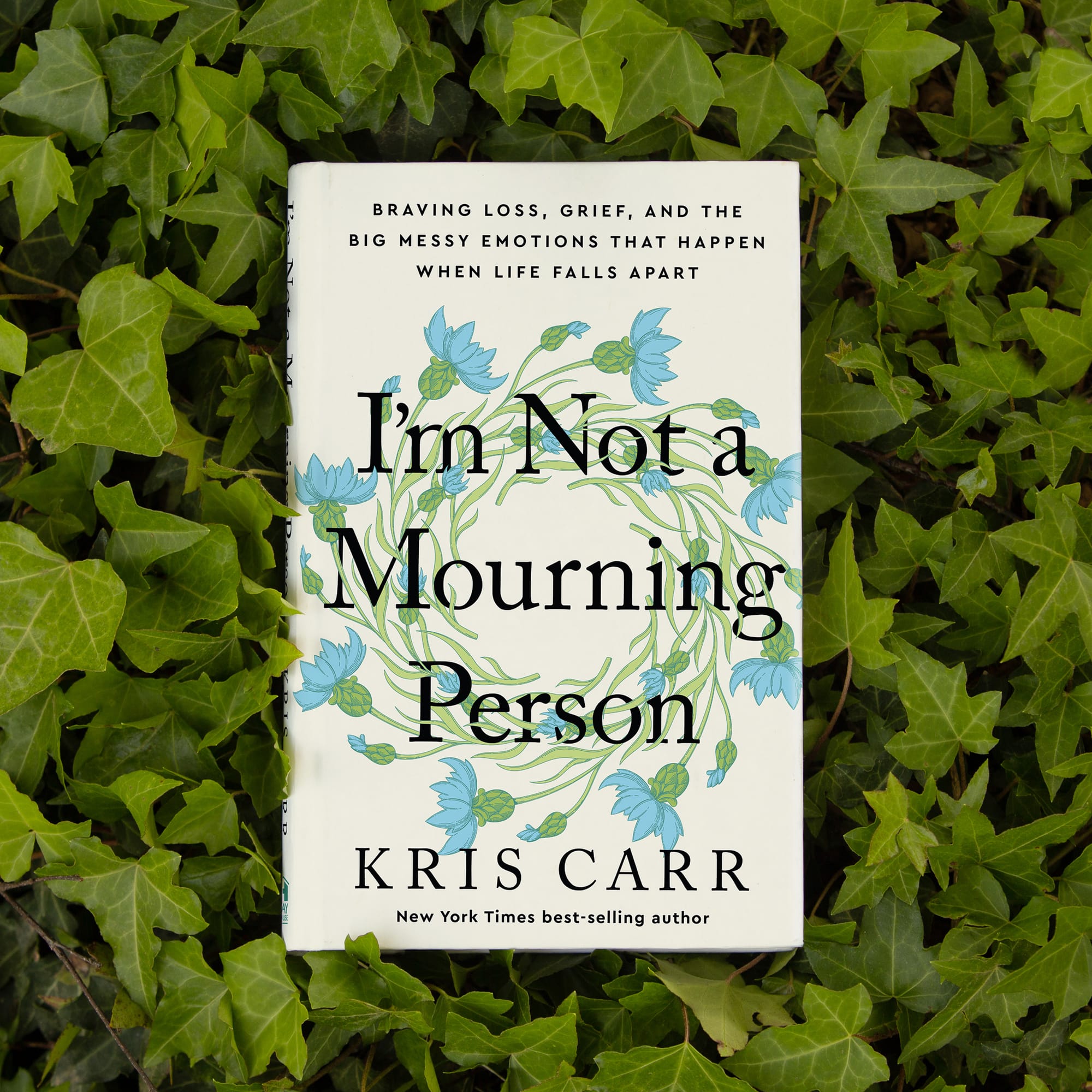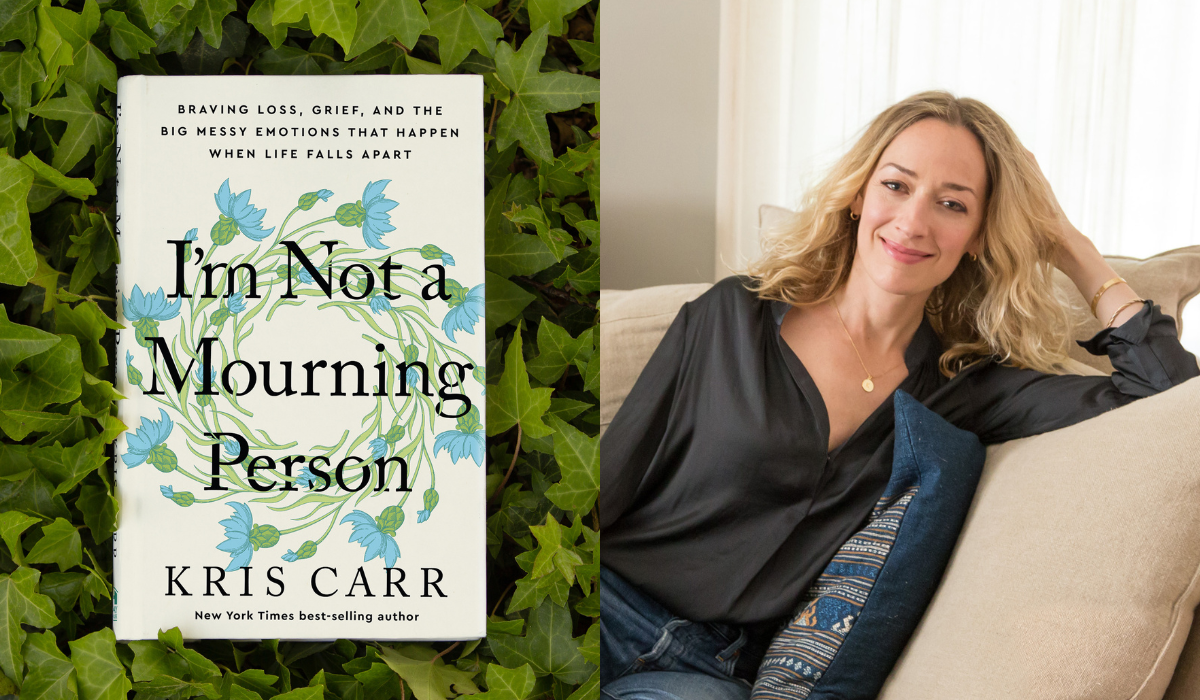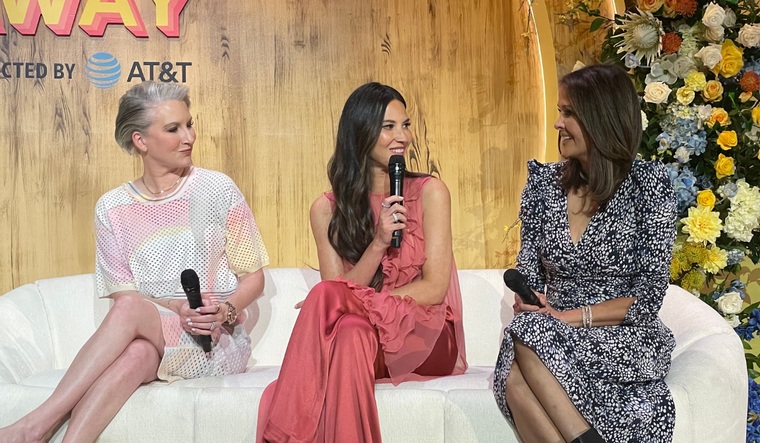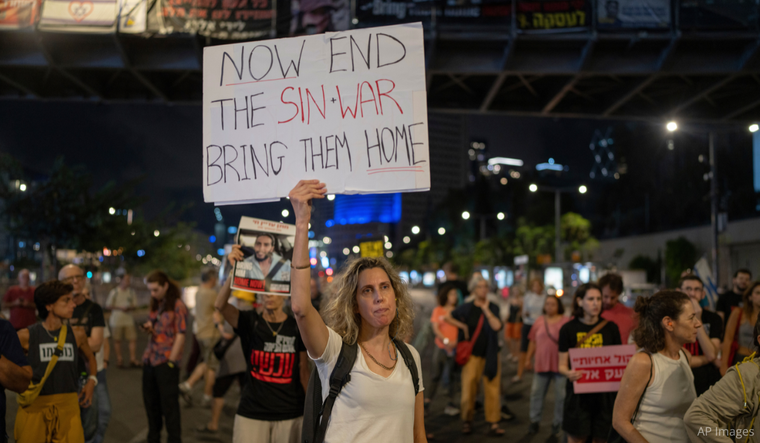When the Holidays Promise Joy, Grief Can Feel Especially Heavy. Bestselling Author Kris Carr Is Here to Walk You Through It
A few years ago, Kris Carr was at a veritable crossroads of grief. In the midst of the global coronavirus pandemic, her business was struggling, her father had just died after a battle with cancer, and she was approaching the 20-year milestone of living with her own Stage IV cancer diagnosis. She was understandably experiencing some big emotions.
So, what did she do?
She cried in the shower, remembering the advice from a well-meaning relative: “Never let anyone see your mascara run.”
Yet at a certain point, Carr couldn’t contain her grief—and she let it rip. What she learned is that while it’s really tough to face loss in our grief-phobic culture, doing so is a worthy endeavor.
This week, The Sunday Paper sat down with Carr to learn more about why it’s important to give ourselves space to grieve—especially during this happiest, merriest time of year—and the best place to start.
A CONVERSATION WITH KRIS CARR
We’re taught to hide our grief—something you talk about in the opening of your new book. Why were you inspired to start there?
I went on the same journey I take the reader on in my new book. My inspiration came from my own cancer diagnosis. Like many people who find themselves up against the ropes with a diagnosis, we tend to start with the practical stuff—the things that we can control. For me, it was about what I put in my body. I wrote several books about that to help people address what they were eating when I realized an anti-inflammatory diet and lifestyle could be so beneficial for cancer patients (and for people who don’t want to be cancer patients).
Then, about a decade into my own wellness journey, I realized it wasn’t just about what I was eating, it was about what was eating me—and learning to tend to that. That’s the hard part. The kale is easier. But I think holistic wellness isn’t just about taking care of the physical body; it’s about taking care of the emotional body as well.
I called the book I’m Not a Mourning Person because I didn’t want to be a morning person. Grief was the one emotion I didn’t want to feel. Yet what I didn’t realize was that grief isn’t a solo flyer; it rolls with all these other complicated emotions that I didn’t want to feel either. It wasn’t until I was coming on my 20-year anniversary of living with stage IV cancer, and my dad was dying of terminal cancer, and my business was faltering, and we were in a global pandemic that I couldn’t hold my grief back anymore. That’s really where my journey started.
What are some of the biggest benefits of letting your grief come out rather than keeping it buttoned up inside?
I think it takes so much energy to hold our grief back, and it’s really draining when we try to do that. It’s like energy management. What are you doing to take care of your energy? The answer is obvious when it comes to things like sleep and eating and movement. It’s less obvious when we think about our emotions. But we know how taxing it is to be suffering. And oftentimes, I find that it’s not even the pain that holds me back, but rather the fear of pain.
I like to compare emotions to our body’s organs. When I was newly diagnosed with cancer, I found out it was in my lungs and liver. I didn’t really know a lot about those organs. And I thought if I could learn about what they do and what they need, maybe I could learn to take care of them better, and that would help my survival.
I think of emotions the same way now. Emotions are there for a reason. We can’t amputate any of them and expect to be whole. If we get curious and we learn a bit about them, then we can understand two things: First, emotions are just information, and oftentimes that information is designed to keep us safe. This can help us observe them and ask, What are you trying to show me? Once we learn more about what’s underneath the emotion, we can learn how to take care of that. Second, remember the idea that emotions are energy? Well, energy needs to be expressed or released, otherwise it gets stagnant. And when it’s stagnant, we don’t feel well.
Has becoming a “mourning person” helped deepen your relationships?
Absolutely. And I think it’s because we’re all craving connection. We’re in an epidemic of loneliness. What do I—and I believe all of us—want? I know I want to connect with the real you. I want to develop deep friendships and lasting relationships with my family, without having all the barriers up. The first step in being able to do that is to lean into honesty. Instead of someone asking, “How are you?” and you say, “I’m fine,” you might say, “You know, I’m going through a rough patch. Thanks for asking.” If I’m honest about how I’m feeling with you, it gives you this opening to be honest back with me. Then, we’re creating deeper relationships than if we were to just to skim along the surface of connection.
Grief can be especially difficult to navigate during the holiday season. Any advice for this time, when we’re supposed to feel happy?
I don’t know if we’re supposed to be happy, but that’s certainly the message that we get. I would start by shifting that into an invitation to be loving. Because love also holds space for the opposite of love, which is sadness.
For example, one of the things that we’ve started to do in my family is leave a place for my dad at the holiday table. We have his picture at the table with us. We pour him a little glass of wine. When we first did this, I would cry. It was hard. I almost didn’t want to have him at the table because I knew it would make me so emotional. But we moved through it. And now, I can’t think of a better way to celebrate the holidays. Now, welcoming my dad to the table is a part of our ritual.
This year, I’ll do the holiday toast and I’ll probably get a little misty, and that’s OK.
For readers who feel inspired to face some tough emotions they’ve been avoiding, what’s the best way to start?
We can’t amputate any of our emotions and expect to be whole. When we have that aching feeling, like something’s off and we’re not fully ourselves, it’s a good opportunity to explore that inner landscape. I promise there are some better feelings on the other side of this exploration.
When we’re going into the difficult places in our hearts, it’s helpful to have support. A friend—a couple of real deep true blues, or maybe even just one, can help you feel like you’re not alone as you start to traverse these areas. A therapist can also be incredibly helpful, because when we start digging, more stuff comes up. I believe it comes up because all those little pieces of us are like, Yay, you guys come forward, she’s brave, now let’s go for it!
Finally, know there’s no timeline. You can go slow. I think the biggest thing that we can give ourselves is space and grace: Space to explore our emotions, and the grace to give ourselves permission that it doesn’t have to look a certain way for it to be a worthy exploration.

Kris Carr is a multiple New York Times best-selling author, wellness activist and cancer thriver. In her new memoir, I’m Not a Mourning Person, she tackles the universal experience of loss with her signature combination of searing vulnerability and irreverent humor.
Please note that we may receive affiliate commissions from the sales of linked products.




